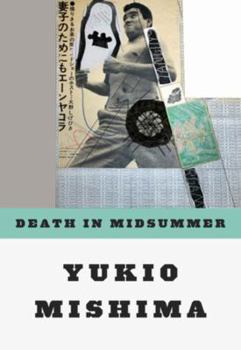Death in Midsummer: And Other Stories
Select Format
Select Condition 
Book Overview
Nine of Yukio Mishima's finest stories were selected by Mishima himself for translation in this book; they represent his extraordinary ability to depict a wide variety of human beings in moments of significance. Often his characters are sophisticated modern Japanese who turn out to be not so liberated from the past as they had thought.
Format:Paperback
Language:English
ISBN:0811201171
ISBN13:9780811201179
Release Date:January 1966
Publisher:New Directions Publishing Corporation
Length:192 Pages
Weight:0.49 lbs.
Dimensions:0.5" x 5.2" x 7.9"
Customer Reviews
5 ratings
Beautiful and slightly painful literature
Published by Thriftbooks.com User , 15 years ago
Mishima writes wonderfully, his themes are so close to the human soul that sometimes they are beautifully painful words to read, but oh if it's worth to read each and every one of his stories in this collection. You'll be a more insightful, soulful human after you are done with this collection of short stories. Inspiring classic literature
Piercing Clarity
Published by Thriftbooks.com User , 21 years ago
Mishima writes with amazing clarity of thought. His sentences are among the clearest I have ever read. I feel at a loss of words, a "poverty of emotion," as Mishima might call it, in trying to write about Death in Midsummer. The only thing I can say - to even try to do him and his book justice - is READ IT!!!
Very impressive
Published by Thriftbooks.com User , 22 years ago
A friend recommended Mishima to me, and this was the book I picked up. First, to respond to a reviewer below, this book (at least my copy) has no introduction, no preface, no afterward, and has numerous translators. The stories were selected by Mishima himself, and the book was published in New York. Reading any "leftist" intentions on the part of the publishers of this book, then, is certainly very strange, unless it was gleaned from the three paragraph synopsis on the back.That having been said, I was immensley impressed by this book. After the first three stories ("Death in Midsummer", "Three Million Yen", and "Thermos Bottle") I was ready to admit the genius of the author. The title story is abridged, and the translation on all three is awkward -- I don't know a bit of Japanese, but the English itself lacked lucidity and had some confused grammar. Nevertheless, there's a remarkable detail to the deliniation of character, a mesmorizing lyrical style, and a powerful look into the psychology of man when confronted with tragic and absurd circumstances. The stories, also, are brilliantly subtle satires of middle class values. The author clearly intends to show the decline in the Japanese character as a result of Westernization and modernization. At some points it hints at leftist values -- a dislike of the bourgeois, a sympathy for the poor, etc. But Mishima's strange and anachronistic political beliefs show us that his work is best read as insight into the identity crisis facing modern Japan, and not as leftist, or even entirely rightist. (I read, while glancing through a biography of the author, a statement he made after speaking to a group of leftist students. He said something to the effect of "We shared a friendship and an understanding, embracing through a barbed fence...")As much as I appreciated the first three stories, however, I found the rest of the book to be much better, revealing an incredible diversity of style and theme. "The Priest and His Love" is a beautiful Buddhist fable exploring the paradox and power of beauty and sensuality. The style of writing reminded me a lot of Pär Lagerkvist. "Patriotism" caught me completely off-guard, and undoubtedly represents the greatest work in the book. Its the story of an officer who commits seppuku (ritual suicide) and his wife, who follows. With great fluidity and poetic grace, Mishima describes their final night together, then, in a frustratingly objective prose, describes the morbid end of the two. Violence and sensuality are tied in with finality, duty and beauty. Mishima was an aesthete, but of the rarest kind -- much in the spirit of Poe, perhaps. The story had an enormous impact of me."Dojoji," auspiciously set after "Patriotism," is one of Mishima's Noh plays, and shifts entirely to the languid, allegorical style that characterizes the Noh (contrasted by the turbulent, grotesque realism of the previous story). The play is about the auction of a giant wardrobe that has a gruesome past.
temples of prose
Published by Thriftbooks.com User , 23 years ago
Mishima writes very stark stories of spiritual emptiness. My favorite is the story Ten Yen about a young couple who must resort to desperate economic measures, the young woman must prostitute herself to earn them money. Mishimas ascetic style is not necessarily uplifting but it does make for an interesting aesthetic intensity. These short stories are each very uniquely populated but that single focus is never lost. They feel quickly executed but perfect like ink drawing, an art where you get one chance only to make a perfect gesture. Existentialism as practiced in the orient. For Mishima authenticity was ritually sought after but the world he wanted to live in was one relegated to the past. Art was no substitute for his imagined and longed for spiritual kingdom though he tried to live as though it was, at least for awhile.
mishima at his best
Published by Thriftbooks.com User , 25 years ago
this personally selected collection of short stories shows mishima at his best. from a surreal no play to gentle stories of mourning and loss, this is all great stuff which translated beautifully. my only reservation would be the story "patriotism", which details the ritual suicide of a young couple- ick. compelling, but not for the weak stomached.





